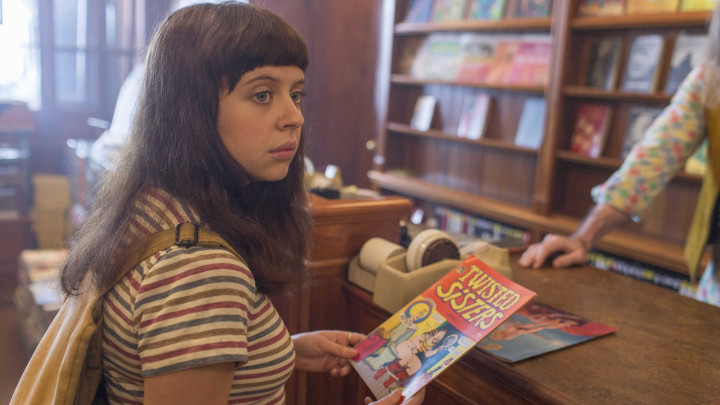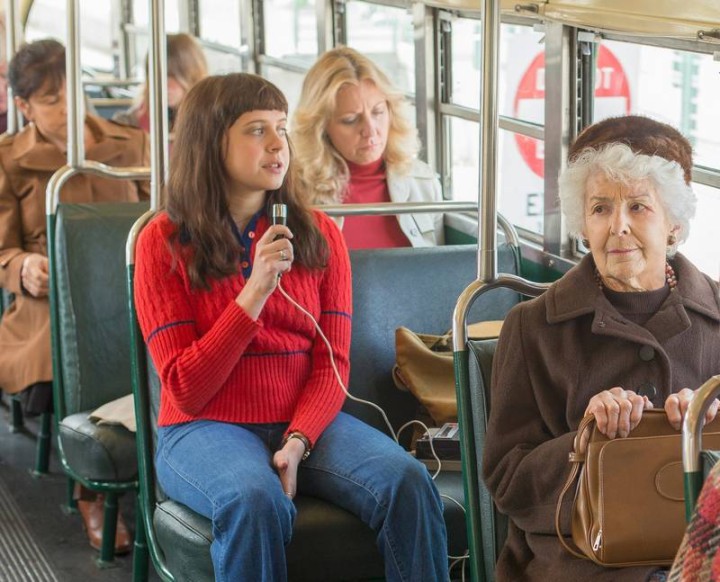Actress-turned-writer-director Marielle Heller has arrived on the scene with The Diary of a Teenage Girl, and, despite its almost universal praise from the critics, it’s the kind of movie that is going to polarize viewers. Some will be enraged by the content, dismiss the film as trash, suggest it will only appeal to perverts, and on and on. What’s the big deal? Well, it’s about a 15-year-old girl named Minnie (played by 22-year-old Brit TV actress Bel Powley) who becomes sexually involved with her mother Charlotte’s (Kristen Wiig) 34-year-old boyfriend Monroe (Alexander Skarsgård). To make matters more problematic, the film refuses to make Minnie a victim, and it remains steadfastly nonjudgmental. It is also brutally frank and probably a lot more honest than it is comfortable. Here’s the point — know this going in, or know it and don’t go in at all if it’s going to upset you. It’s also worth keeping in mind that the film was made by a woman and based on a quasi-autobiographical novel by another woman, Phoebe Gloeckner.
The film is set in San Francisco in 1976, which makes the story very much of another place and time. Life was very different then. Maybe it was more cynical. It was certainly a less guarded time — in part, I suspect, because mass communications hadn’t reached a saturation point. The movie keeps this in mind and so should the viewer. I have my own set of issues with the film — not the least of which is finding it incredible that the soundtrack choices for a a movie taking place when I was 21 were mostly unknown to me. (I concede this may be an East Coast/West Coast thing.) But my biggest issue comes from the nagging question I’m left with: Who is the audience for The Diary of a Teenage Girl? And I’m really not sure. While I admired the film on a number of levels, I was never deeply affected by it, and I’m fairly sure I’ll barely remember it a few months down the road.
When all is said and done, this is essentially a coming-of-age picture. Granted, it’s an unusually raw one and not aimed at the PG-13 crowd. It’s a movie that opens with our main character happily announcing, “I had sex today. Holy shit!” and it’s not long before we learn who it is she had sex with, so, no, it’s not your standard coming-of-age movie. But it ultimately serves the same basic function and — daring material and some artistic animations to one side — adheres to the basic template of the genre. That’s not so much a criticism as an observation, though I will note that other, less overtly edgy coming-of-age movies like The Perks of Being a Wallflower (2012) worked better for me.
The film basically recounts — via Minnie’s cassette-tape diary — the period in her life when she started finding out who she was and lost at least some of her issues with herself. That she mistakes what she has with Monroe for love — at least until she gets a look at his real self (or so she thinks) — is only part of the picture. Just as important is her discovering her artistic muse in the comics of Aline Kominsky — who later appears in animated form as a kind of imaginary friend and adviser. There’s also coming to terms with her party-girl mother’s own issues. The interesting — and maybe not entirely realistic — aspect of all this is that, like the film, Minnie is largely nonjudgmental about it all. If not that, she’s at least remarkably understanding of the shortcomings of others.
I pull up short at calling Diary a must-see. I do admire its candor and honesty. I like the way the film manages to find humor in some pretty tricky places — like Minnie recording her brazenly sexual diary on a bus, oblivious to the shocked passengers. I also like the way her mother finds out the truth by listening to the cassette diary, and having Minnie walk in on her. (Who among us did not have a similar youthful experience, though maybe with less scandalous secrets?) And the complexity of her mother’s feelings — part horror at the idea of Minnie having an inappropriate lover, and part jealousy over it being her own boyfriend — is very fine. But something keeps me from quite warming to the film. You may feel differently. Rated R for strong sexual content including dialogue, graphic nudity, drug use, language and drinking — all involving teens.
Playing at Carolina Cinemas.









Before you comment
The comments section is here to provide a platform for civil dialogue on the issues we face together as a local community. Xpress is committed to offering this platform for all voices, but when the tone of the discussion gets nasty or strays off topic, we believe many people choose not to participate. Xpress editors are determined to moderate comments to ensure a constructive interchange is maintained. All comments judged not to be in keeping with the spirit of civil discourse will be removed and repeat violators will be banned. See here for our terms of service. Thank you for being part of this effort to promote respectful discussion.